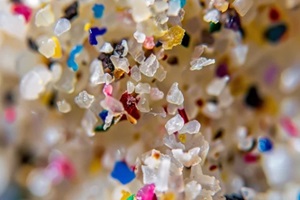September 5, 2024

The plastic industry is taking a closer look at a new biodegradable polymer made from algae oil that is actively revolutionizing the fight against plastic pollution. This new, cutting-edge material provides a sustainable alternative plastic to traditional plastic materials and helps reduce the prevalence of microplastics in our environment and the potential impact that they can have.
The polymer decomposes with increased efficiency, resulting in a significant reduction in the amount of harmful remnants that are left behind. We are breaking down for you, the science behind this breakthrough, its potential applications, and its impact on environmental sustainability.
In recent years, significant progress has been made in developing sustainable alternatives to traditional plastics, largely driven by discoveries related to microplastics. A significant portion of the research in that area has been dedicated to developing methods for gathering and eliminating microplastics from the environment to mitigate potential health risks and environmental impact.
One of the most promising advancements is the creation of a new biodegradable polymer derived from algae oil, which offers a potential solution to the pervasive issue of microplastics in the environment.
Researchers from the University of California, San Diego (UC San Diego) and the materials science company Algenesis have pioneered a groundbreaking plant-based polymer that biodegrades, even when reduced to microplastics, in under seven months.
This innovative process begins with the selection of algae oil as a raw material, which was chosen for its notable abundance as a material along with its exceptional sustainability and renewability. Algae oil offers several distinct advantages over traditional petroleum-based sources, including a smaller environmental footprint and faster degradation rates.
The process of converting algae oil into a usable biodegradable polymer involves several important steps:
Innovative techniques, including advanced catalysis and bioprocessing methods, are employed in this process to enhance the efficiency and scalability of the conversion.
From the outset, the researchers aimed to create a fully biodegradable plastic that could break down completely in natural environments. The criteria for what constitutes biodegradability include rapid decomposition into non-toxic components without leaving harmful residues.
The new polymer meets these standards, breaking down in under seven months compared to traditional plastic materials, which can persist for hundreds of years.
The introduction of algae-based plastic has opened up numerous possibilities for practical applications in a wide variety of industries.

Algae-based plastic is already being utilized in a range of consumer products, demonstrating its versatility and practicality. Some notable examples to look at include biodegradable shoes, cell phone cases, and packaging materials.
Each of these environmentally friendly products showcases the material’s ability to meet the demands of everyday use while offering an eco-friendly alternative to current petroleum-based polymers.
The potential for algae-based plastic to replace petroleum-based plastic materials on a larger scale is significant.
The transition could bring substantial environmental benefits, such as reduced carbon emissions and less plastic pollution. Economically, it offers a renewable and potentially less expensive alternative since algae can be cultivated quickly and in a sustainable manner.
However, there are some challenges to widespread adoption, which include the need for investment in production infrastructure, overcoming existing market inertia, and creating consistent supply chains for algae oil.
Despite these obstacles, industry experts remain optimistic. Market analysts point out that algae-based biopolymers have a good biodegradation rate, making them suitable for industrial applications like food packaging and agriculture.
With continued research and development, coupled with supportive policies and consumer demand, algae-based plastics could become a mainstream solution, significantly reducing our reliance on petroleum-based materials.
The adoption of algae-based plastic offers significant advantages for both the environment and public health as a whole.
Microplastics have been found in oceans, soil, and even the air, posing a severe threat to ecosystems. Algae-based plastic materials have the ability to play an important role in reducing the amount of microplastics that are in the environment.
Unlike traditional petroleum-based plastic materials, which break down into persistent microplastics that linger in the environment, this biodegradable polymer decomposes completely, thereby minimizing its ecological impact.
The new biodegradable polymer helps mitigate the potential health risks by breaking down completely, preventing the accumulation of microplastics in the environment.
Through use of algae-based plastic, we can create a healthier ecosystem and reduce the potential for microplastic-related health issues.

As you can see, the development of algae-based biodegradable polymers represents a significant leap forward in the advancements of plastic materials, directly impacting plastic pollution and any related health issues that come from it. With further research and innovation, these materials hold the promise and potential to reimagine plastic materials and the plastic industry as we know them.
To stay informed about the latest advancements in sustainable materials, connect with PLASTICS, the Plastics Industry Association. PLASTICS is the voice of the plastics industry, bringing together the full supply chain to build consensus, advocate thoughtful perspectives and solutions, and provide valuable information to help our members succeed in the marketplace.
Since 1937, we’ve been steadfast in our commitment to making our members more globally competitive while supporting circularity and sustainability through educational initiatives, industry insights, events, and policy advocacy.
PLASTICS and the Future Leaders in Plastics (FLiP) Committee are devoted to supporting and encouraging the next generation of plastics leaders who will play a crucial role in the innovation, technology and future of the plastics industry. FLiP’s mission is to provide young professionals under the age of 40 the exposure, education and resources they need to build lifelong careers in plastics. Want to join? Want to get your employees involved? Email: flip@plasticsindustry.org